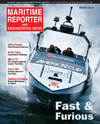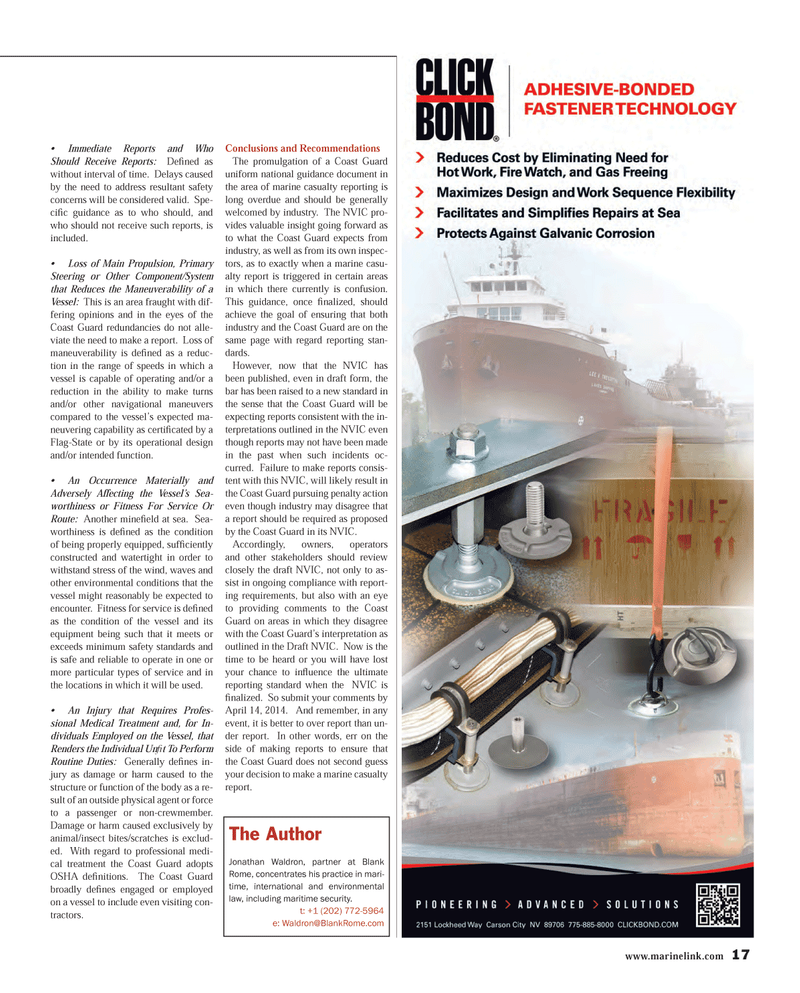
Page 17: of Maritime Reporter Magazine (March 2014)
U.S. Coast Guard Annual
Read this page in Pdf, Flash or Html5 edition of March 2014 Maritime Reporter Magazine
www.marinelink.com 17 • Immediate Reports and Who
Should Receive Reports: Defi ned as without interval of time. Delays caused by the need to address resultant safety concerns will be considered valid. Spe- cifi c guidance as to who should, and who should not receive such reports, is included. • Loss of Main Propulsion, Primary
Steering or Other Component/System that Reduces the Maneuverability of a
Vessel: This is an area fraught with dif- fering opinions and in the eyes of the
Coast Guard redundancies do not alle- viate the need to make a report. Loss of maneuverability is defi ned as a reduc- tion in the range of speeds in which a vessel is capable of operating and/or a reduction in the ability to make turns and/or other navigational maneuvers compared to the vessel’s expected ma- neuvering capability as certifi cated by a
Flag-State or by its operational design and/or intended function. • An Occurrence Materially and
Adversely Affecting the Vessel’s Sea- worthiness or Fitness For Service Or
Route: Another minefi eld at sea. Sea- worthiness is defi ned as the condition of being properly equipped, suffi ciently constructed and watertight in order to withstand stress of the wind, waves and other environmental conditions that the vessel might reasonably be expected to encounter. Fitness for service is defi ned as the condition of the vessel and its equipment being such that it meets or exceeds minimum safety standards and is safe and reliable to operate in one or more particular types of service and in the locations in which it will be used. • An Injury that Requires Profes- sional Medical Treatment and, for In- dividuals Employed on the Vessel, that
Renders the Individual Unfi t To Perform
Routine Duties: Generally defi nes in- jury as damage or harm caused to the structure or function of the body as a re- sult of an outside physical agent or force to a passenger or non-crewmember.
Damage or harm caused exclusively by animal/insect bites/scratches is exclud- ed. With regard to professional medi- cal treatment the Coast Guard adopts
OSHA defi nitions. The Coast Guard broadly defi nes engaged or employed on a vessel to include even visiting con- tractors.
Conclusions and Recommendations
The promulgation of a Coast Guard uniform national guidance document in the area of marine casualty reporting is long overdue and should be generally welcomed by industry. The NVIC pro- vides valuable insight going forward as to what the Coast Guard expects from industry, as well as from its own inspec- tors, as to exactly when a marine casu- alty report is triggered in certain areas in which there currently is confusion.
This guidance, once fi nalized, should achieve the goal of ensuring that both industry and the Coast Guard are on the same page with regard reporting stan- dards.
However, now that the NVIC has been published, even in draft form, the bar has been raised to a new standard in the sense that the Coast Guard will be expecting reports consistent with the in- terpretations outlined in the NVIC even though reports may not have been made in the past when such incidents oc- curred. Failure to make reports consis- tent with this NVIC, will likely result in the Coast Guard pursuing penalty action even though industry may disagree that a report should be required as proposed by the Coast Guard in its NVIC.
Accordingly, owners, operators and other stakeholders should review closely the draft NVIC, not only to as- sist in ongoing compliance with report- ing requirements, but also with an eye to providing comments to the Coast
Guard on areas in which they disagree with the Coast Guard’s interpretation as outlined in the Draft NVIC. Now is the time to be heard or you will have lost your chance to infl uence the ultimate reporting standard when the NVIC is fi nalized. So submit your comments by
April 14, 2014. And remember, in any event, it is better to over report than un- der report. In other words, err on the side of making reports to ensure that the Coast Guard does not second guess your decision to make a marine casualty report.
The Author
Jonathan Waldron, partner at Blank
Rome, concentrates his practice in mari- time, international and environmental law, including maritime security. t: +1 (202) 772-5964 e: [email protected]
MR #3 (10-17).indd 17 3/4/2014 9:55:30 AM

 16
16

 18
18
